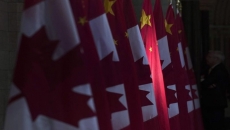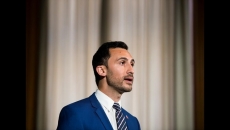Questions over whether thousands of international students could be deported from the U.S. under a new Trump administration policy are causing consternation among school officials and anxiety among Canadians studying south of the border.
The policy — which triggered a lawsuit from Harvard University and the Massachusetts Institute of Technology (MIT) on Wednesday — stipulates that international students who take a fully virtual course this fall will not be allowed to remain in the country.
Under the new guidelines, international students would still be able to take more online courses than normal, but will have their visa rescinded if they attempt to take a fully online course load.
According to a statement released by the U.S. Immigration and Customs Enforcement agency on Monday, international students will only be able to remain in the country if they are taking a mix of in-person and virtual classes.
While Canadians do not need a visa to study in the U.S., they are still required to produce a similar form, known as an I-20, signed by the school they are attending. That school will now need to offer hybrid courses in order for Canadian students to stay in the country.
Sarah Klassen, an accounting student at Wichita State University, said her school has not yet determined how it will deal with the policy.
But Klassen, 19, notes that being forced to leave the U.S. would likely be a death blow for her studies, as she relies on a bowling scholarship to pay her tuition.
"I’m scared even going down (to the border) now that I might not be able to get back in. There's so many strict guidelines," Klassen said over the phone from her family home in Niagara-on-the-Lake, Ont.
Yvonne Kang, who is earning her law degree at the University of Connecticut, said being forced to move back home to Toronto would involve breaking a newly signed lease on an apartment and cost her thousands of dollars in unnecessary expenses.
Kang, 23, said says she doesn't understand why ICE is targeting international students when they are such a major contributor to the American economy.
"We pay American landlords, we go grocery shopping in American stores, they charge international students double the tuition (of domestic students)," she said.
The Institute for International Education puts the number at roughly $45 billion in 2018, with more than $1.1 billion of that coming from Canadians. A report from the institute estimated there were 26,170 Canadians studying in the U.S. in 2018-2019.
The new guidelines have provoked backlash from universities across the U.S., with Harvard president Lawrence Bacow saying the order's "cruelty" is surpassed only by its "recklessness."
"It appears that it was designed purposefully to place pressure on colleges and universities to open their on-campus classrooms for in-person instruction this fall, without regard to concerns for the health and safety of students, instructors, and others," Bacow said.
"This comes at a time when the United States has been setting daily records for the number of new (COVID-19) infections, with more than 300,000 new cases reported since July 1."
Edward Alden, a senior fellow with the Council on Foreign Relations, a New York-based think tank, said the new policy creates an "onerous" task for students and institutions to undertake.
"Most schools are still trying to figure out what their mix (between online and in-person classes) is going to be," Alden said.
"Now they're going to have to scrape together a new program and reissue I-20s — and make it all happen in under a month.”
ICE is enacting the policy through a program that was introduced after 9/11 to handle the screening and verification of international students.
The program designates whether an individual qualifies for the F, M or J-class visas that are required to enter and reside in the U.S. as a student.
Normally, guidelines forbid international students from taking more than one course online per semester, but that restriction was relaxed when the COVID-19 pandemic caused a global lockdown in March.
International students who were outside of the country when the pandemic began and continue to take online courses from abroad will not have their status affected, nor will their visa be rescinded, according to documents from ICE.
But students who are currently living in the U.S. and whose schools are going fully online next semester will have only two options: leave the country or transfer to a different school. The news from ICE, released on the same day Harvard announced that all of its 2020-2021 fall classes would be online-only, sent ripples of outrage across the country.
Dozens of colleges have said they plan to offer at least some classes in person this fall, but some say it's too risky.
The University of Southern California last week reversed course on a plan to bring students to campus, saying classes will be hosted primarily or exclusively online.






